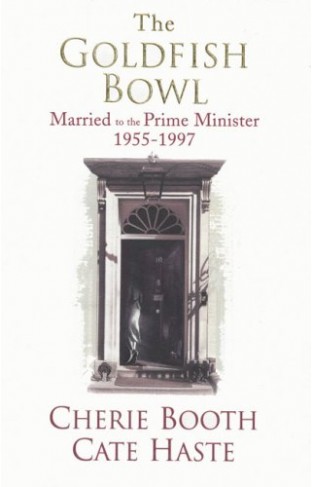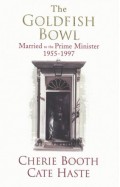The Goldfish Bowl: Married to the Prime Minister
By: Cherie Booth
-
Rs 4,300.00
Due to constant currency fluctuation, prices are subject to change with or without notice.
We're offering a high
discount on this book as it is slightly damaged
When your husband (or wife, in Denis Thatcher's case) becomes Prime Minister, and the doors of No.10 close behind you, every aspect of life is suddenly changed. This was what Cherie Booth discovered. Intrigued, Cherie and social historian Cate Haste set out to explore the experience of previous political generations since the 1950s. Were the 'consorts' prepared for their role, or were they taken by surprise? How did they deal with life at No 10? How intrusive was the press, and how has this changed over the years? How did they find a way to live their own lives and conduct a marriage and a family life? How far did they feel caught up in the great events and crises of the day? Based on personal interviews, diaries and letters, and the accounts of surviving spouses, families, close friends and colleagues, the story begins with three Conservatives, who moved with almost hereditary ease in the circles of high politics - Clarissa Eden, Dorothy Macmillan and Elizabeth Home. Then the situation changes with the arrival of Labour governments, and we observe life as it was for Mary Wilson and Audrey Callaghan, before moving on to the contrasting experiences of Denis Thatcher - the only man ever to occupy the role - and Norma Major. Against a backdrop of dramatic events on the world stage, from the Suez crisis, the Cold War, the swinging sixties and the three-day week, through to the Thatcher years and the Gulf War, we see radical changes in social attitudes and in the media reflected in their lives. In a final chapter Cherie Booth gives her personal commentary on her predecessors' experience. Set against the background of the changing place of women in our society, this illuminating and intimate book explores the pressures and rewards of daily life in the 'goldfish bowl' of No. 10 and Chequers, and offers fascinating insights into the 'political marriage' and the changing role of the leader's spouse. (2003-12-08)
We're offering a high
discount on this book as it is slightly damaged
When your husband (or wife, in Denis Thatcher's case) becomes Prime Minister, and the doors of No.10 close behind you, every aspect of life is suddenly changed. This was what Cherie Booth discovered. Intrigued, Cherie and social historian Cate Haste set out to explore the experience of previous political generations since the 1950s. Were the 'consorts' prepared for their role, or were they taken by surprise? How did they deal with life at No 10? How intrusive was the press, and how has this changed over the years? How did they find a way to live their own lives and conduct a marriage and a family life? How far did they feel caught up in the great events and crises of the day? Based on personal interviews, diaries and letters, and the accounts of surviving spouses, families, close friends and colleagues, the story begins with three Conservatives, who moved with almost hereditary ease in the circles of high politics - Clarissa Eden, Dorothy Macmillan and Elizabeth Home. Then the situation changes with the arrival of Labour governments, and we observe life as it was for Mary Wilson and Audrey Callaghan, before moving on to the contrasting experiences of Denis Thatcher - the only man ever to occupy the role - and Norma Major. Against a backdrop of dramatic events on the world stage, from the Suez crisis, the Cold War, the swinging sixties and the three-day week, through to the Thatcher years and the Gulf War, we see radical changes in social attitudes and in the media reflected in their lives. In a final chapter Cherie Booth gives her personal commentary on her predecessors' experience. Set against the background of the changing place of women in our society, this illuminating and intimate book explores the pressures and rewards of daily life in the 'goldfish bowl' of No. 10 and Chequers, and offers fascinating insights into the 'political marriage' and the changing role of the leader's spouse. (2003-12-08)
Zubin Mehta: A Musical Journey (An Authorized Biography)
By: VOID - Bakhtiar K. Dadabhoy
Rs 840.00 Rs 1,050.00 Ex Tax :Rs 840.00
Myths Illusions and Peace: Finding a New Direction for America in the Middle East
By: Dennis Ross
Rs 1,095.00 Ex Tax :Rs 1,095.00
The Origins of Political Order From Prehuman Times to the French RevolutioN
By: Francis Fukuyama
Rs 4,495.00 Ex Tax :Rs 4,495.00
Manning Up: How the Rise of Women Has Turned Men into Boys
By: Kay Hymowitz
Rs 995.00 Ex Tax :Rs 995.00
The Obama Syndrome: Surrender At Home War Abroad
By: Tariq Ali
Rs 1,036.00 Rs 1,295.00 Ex Tax :Rs 1,036.00
The Quest For Meaning: Developing A Philosophy Of Pluralism
By: Tariq Ramadan
Rs 1,116.00 Rs 1,395.00 Ex Tax :Rs 1,116.00
No similar books from this author available at the moment.
No recently viewed books available at the moment.
Zubin Mehta: A Musical Journey (An Authorized Biography)
By: VOID - Bakhtiar K. Dadabhoy
Rs 840.00 Rs 1,050.00 Ex Tax :Rs 840.00














-120x187.jpg?q6)






-120x187.jpg?q6)






